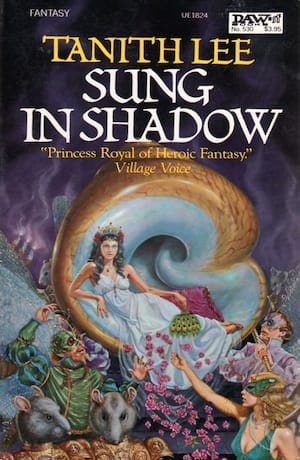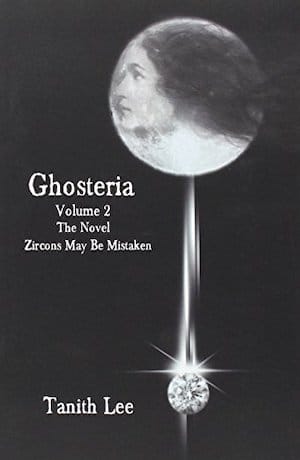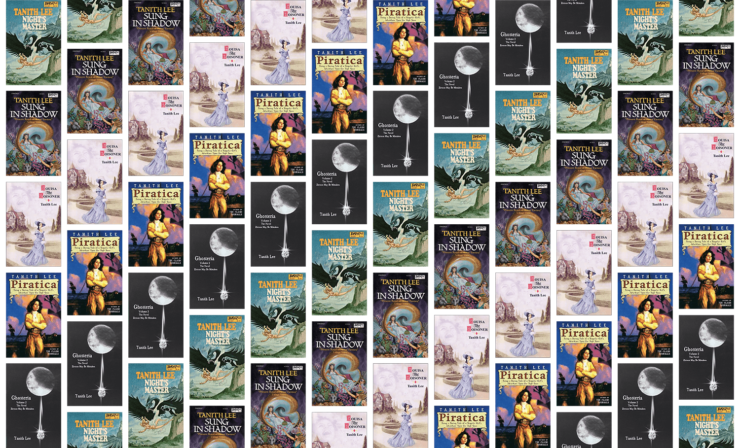September 19th would have been Tanith Lee’s seventy-sixth birthday. Between her first sale in 1968 and her death in 2015, Lee published over ninety books and 200 short stories. As Roz Kaveney’s obituary for Lee detailed, Lee’s work was astonishingly wide-ranging:
(Lee) produced adult and young adult novels, science fiction, fantasy, horror, crime, spy fiction, erotica, a historical novel (The Gods Are Thirsty, in 1996, about the French Revolution, one of her many obsessions), radio plays, and two episodes of the television space opera Blake’s 7.
Until about 1990, Lee’s lushly decadent fiction enjoyed considerable popularity. After 1990, she experienced difficulty in selling her work to publishers, particularly North American publishers, who once favored her books and stories. However, we live in a golden age of reprints, and much of her backlist is available once more.
Given ninety books to choose from, where should one start? Readers could consider these five exemplary Lee works, drawn from across her career.
Night’s Master (1978)

In the days when the Earth was flat, the gods turned their backs on their mortal creations. Only demons took an active interest in the Flat Earth. Demons love to break their toys. It’s a bad era in which to be mortal.
Night’s Master is a cycle of tales focused on the great and powerful demon prince Azhrarn. Proud, vindictive, and cruel, Azhrarn’s one virtue—his love of beauty—is no asset when coupled with his faults. The result? A trail of calamity as the demon by turns amuses himself and punishes those who have disappointed him.
One might compare Azhrarn to Satan, except for one detail: Satan fell but Azhrarn was bad from his beginning. Readers may be assured that Azhrarn eventually experiences a suitable fate.
Sung in Shadow (1983)

Like Verona, Sana Verensa is divided between powerful families whose love of violence is second only to their enthusiasm for vendetta. The Montargos hate the Chentis. The Chentis loathe the Montargos. Surely romance between a Montargo and a Chenti is as unthinkable as romance between a Montague and a Capulet.
Handsome, debauched Romulan Montargo and beautiful, naive Iuletta Chenti’s romance is as foreordained as it is doomed. To meet is to fall in love; to fall in love invites calamity. The only question appears to be how misfortune will manifest and which lover will die first.
Lee finds a new spin on a familiar tale by understanding that secondary fantasy universes offer solutions not available to Shakespeare’s star-crossed lovers. This would be the novel that inspired a friend of mine to observe that you cannot spell necromancer without “romance.”
Louisa the Poisoner (1995)

Raised by a mad, witchy aunt, Louisa possesses detailed knowledge about poisons, a clear grasp of her own best interests, and a comprehensive absence of morals. Her aunt having tragically died after Louisa poisoned her, Louisa sets out to find her fortune. Consequently, the world will become a less crowded place.
Kindly Lord Maskullance is as generous as he is oblivious to other people’s manifest flaws. Maskullance makes Louisa his ward. As such, she can expect to inherit some of his wealth. Louisa would prefer to inherit all of Lord Maskullance’s wealth. Bad news for the other heirs, none of whom have cultivated the immunity to toxins required by those sharing an inadvertent tontine with Louisa. Excellent news for Louisa, who is very good at what she does.
Readers of a certain age might be reminded of Kind Hearts and Coronets, save for one very important difference. Whereas films of a certain vintage were compelled to ensure that homicidal heirs eventually faced justice, no such forces are at work in this inspiring Horatio Alger-esque tale of ambitious homicide.
Piratica: Being a Daring Tale of a Singular Girl’s Adventure Upon the High Seas (2006)

In seventeen-twelvety, sixteen-year-old amnesic orphan Artemesia “Art” Fitz-Willoughby Weatherhouse suddenly remembers that her late mother Molly Faith was the dread Piratica. Art flees the Angels Academy for Young Maidens, reinventing herself as Art Blastside. She need only acquire a crew and a ship, and Art Blastside will become a pirate as legendary as Piratica.
Art’s recovered memories are slightly flawed: Molly was not a pirate but an actress. Piratica was a role Molly played. Piratica’s “crew” were likewise actors. However, the cast unwittingly possesses a treasure that the very genuine pirate Little Golden Girl would literally kill to own. Can acting skills prevail against someone experienced in the art of applied murder?
As the year indicates, this is a secondary universe in which plausibility is not necessarily job one. That said, death is final in this setting, pirates are surprisingly dangerous, and if Little Golden Girl doesn’t murder would-be pirate Art, the English Republic may well hang the delusional sixteen-year-old. Still, it’s all in good fun.
Zircons May Be Mistaken (2014)

The world became an empty, quiet place after the Terror of 2020, when corpses rose and ate the living. The inhabitants of one stately mansion avoided becoming victims through a simple method: all are intangible ghosts who perished before the Terror. Not only are they too dead to die, the five ghosts are too intangible for zombies to affect.
Centuries of post-apocalyptic spectral boredom find a cure when the shades realize that while ghosts are immune to zombies, the reverse is not true at all. The shades can possess the walking corpses, and enjoy, at least for a time, the pleasures of corporeal existence. As the ghosts discover, there is a cost. Physical brains restore memories long forgotten, disquieting memories with which the dead will somehow have to come to terms.
This may be the most life-affirming zombie apocalypse novel I have read. In fact, until I read this novel, I don’t know that I’d ever had cause to use the phrase “life-affirming zombie apocalypse novel.” Yes, Stephanie Mabey’s Zombie Song is as upbeat, but it’s a song, not a novel.
***
Those of you unfamiliar with Lee may find the website Daughter of the Night: An Annotated Tanith Lee Bibliography of great use when assembling lists of Lee books for which to search. Others, already familiar with Lee, may be vexed that I overlooked some of their favorites: with over ninety books to choose from, that was inevitable. Feel free to make the case for your favorites in comments below.
In the words of fanfiction author Musty181, four-time Hugo finalist, prolific book reviewer, and perennial Darwin Award nominee James Davis Nicoll “looks like a default mii with glasses.” His work has appeared in Interzone, Publishers Weekly and Romantic Times as well as on his own websites, James Nicoll Reviews (where he is assisted by editor Karen Lofstrom and web person Adrienne L. Travis) and the 2021, 2022, and 2023 Aurora Award finalist Young People Read Old SFF (where he is assisted by web person Adrienne L. Travis). His Patreon can be found here.










